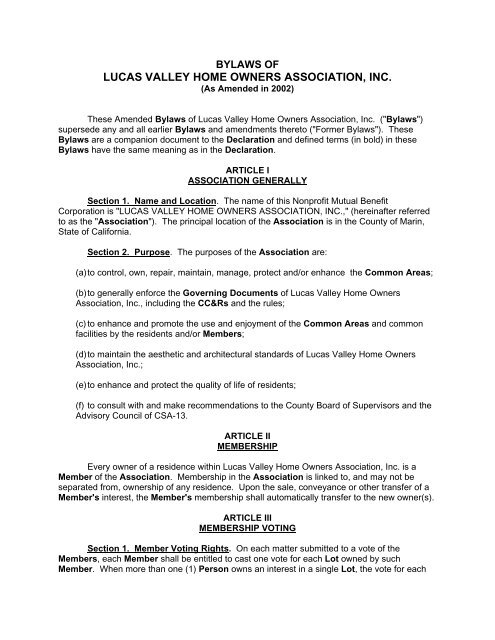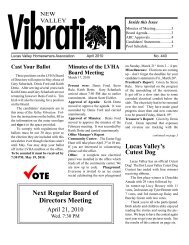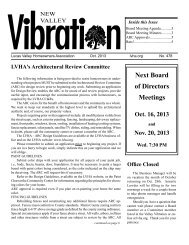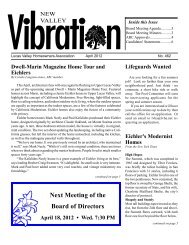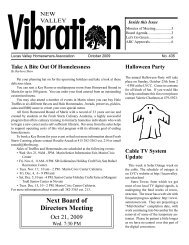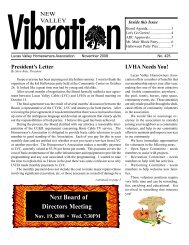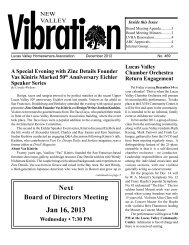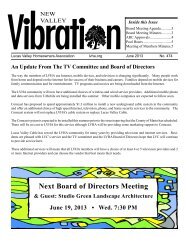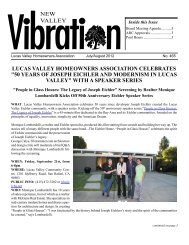BYLAWS OF - Lucas Valley Homeowners Association
BYLAWS OF - Lucas Valley Homeowners Association
BYLAWS OF - Lucas Valley Homeowners Association
Create successful ePaper yourself
Turn your PDF publications into a flip-book with our unique Google optimized e-Paper software.
<strong>BYLAWS</strong> <strong>OF</strong><br />
LUCAS VALLEY HOME OWNERS ASSOCIATION, INC.<br />
(As Amended in 2002)<br />
These Amended Bylaws of <strong>Lucas</strong> <strong>Valley</strong> Home Owners <strong>Association</strong>, Inc. ("Bylaws")<br />
supersede any and all earlier Bylaws and amendments thereto ("Former Bylaws"). These<br />
Bylaws are a companion document to the Declaration and defined terms (in bold) in these<br />
Bylaws have the same meaning as in the Declaration.<br />
ARTICLE I<br />
ASSOCIATION GENERALLY<br />
Section 1. Name and Location. The name of this Nonprofit Mutual Benefit<br />
Corporation is "LUCAS VALLEY HOME OWNERS ASSOCIATION, INC.," (hereinafter referred<br />
to as the "<strong>Association</strong>"). The principal location of the <strong>Association</strong> is in the County of Marin,<br />
State of California.<br />
Section 2. Purpose. The purposes of the <strong>Association</strong> are:<br />
(a) to control, own, repair, maintain, manage, protect and/or enhance the Common Areas;<br />
(b) to generally enforce the Governing Documents of <strong>Lucas</strong> <strong>Valley</strong> Home Owners<br />
<strong>Association</strong>, Inc., including the CC&Rs and the rules;<br />
(c) to enhance and promote the use and enjoyment of the Common Areas and common<br />
facilities by the residents and/or Members;<br />
(d) to maintain the aesthetic and architectural standards of <strong>Lucas</strong> <strong>Valley</strong> Home Owners<br />
<strong>Association</strong>, Inc.;<br />
(e) to enhance and protect the quality of life of residents;<br />
(f) to consult with and make recommendations to the County Board of Supervisors and the<br />
Advisory Council of CSA-13.<br />
ARTICLE II<br />
MEMBERSHIP<br />
Every owner of a residence within <strong>Lucas</strong> <strong>Valley</strong> Home Owners <strong>Association</strong>, Inc. is a<br />
Member of the <strong>Association</strong>. Membership in the <strong>Association</strong> is linked to, and may not be<br />
separated from, ownership of any residence. Upon the sale, conveyance or other transfer of a<br />
Member's interest, the Member's membership shall automatically transfer to the new owner(s).<br />
ARTICLE III<br />
MEMBERSHIP VOTING<br />
Section 1. Member Voting Rights. On each matter submitted to a vote of the<br />
Members, each Member shall be entitled to cast one vote for each Lot owned by such<br />
Member. When more than one (1) Person owns an interest in a single Lot, the vote for each
Lot must be cast as a majority of co-owners of the Lot determine. Any vote cast by a single<br />
Member shall be deemed the authorized vote for that Lot. If conflicting votes are cast for the<br />
Lot, no vote shall be counted except a single vote shall be counted for purposes of a quorum.<br />
Section 2. No Cumulative Voting. There shall be no cumulative voting.<br />
Section 3. Proxies.<br />
(a) Proxies Generally. Any Member entitled to vote may do so either in person or<br />
by agent authorized by a written proxy filed with the Secretary of the <strong>Association</strong>. A proxy<br />
is a document by which a Member authorizes or directs an agent to cast the Member’s<br />
vote. To be valid, a proxy must be signed and dated.<br />
(b) Duration of Proxies. The duration of a proxy may be for:<br />
(1) a vote on a specific matter or election;<br />
(2) a specific meeting and any continuation of such meeting;<br />
(3) up to eleven (11) months from the date of execution if not otherwise specified;<br />
(4) a maximum of three years from the date of execution if so specified.<br />
(c) Effectiveness of Proxies. A proxy continues in force until revoked by the<br />
issuing Member prior to the vote or on expiration. Any proxy may be revoked by the<br />
Member at any time prior to the vote by:<br />
(1) delivery to the Secretary of a signed, dated, written notice of revocation,<br />
(2) a later proxy signed and dated by the Member and presented at the meeting, or<br />
(3) by attendance at any meeting and voting in person by the Member.<br />
A proxy shall be deemed revoked when the Secretary receives actual notice of the death or<br />
judicially declared incompetence of the Member issuing the proxy, or upon termination of<br />
such Member's status as an owner.<br />
(d) Validity of Proxies With Respect to Certain Material Transactions. Any<br />
proxy given with respect to any of the matters described in this subparagraph shall be valid<br />
only if the proxy form sets forth a general description of the nature of the matter on which to<br />
be voted. The matters subject to this requirement are:<br />
(1) Removal of Directors without cause;<br />
(2) Filling of vacancies on the Board;<br />
(3) Approval of contracts or transactions between the <strong>Association</strong> and one<br />
or more Directors, or between the <strong>Association</strong> and a corporation, firm or other entity in<br />
which one or more of the Directors has a material financial interest;<br />
(4) Amendment of the Articles, these Bylaws, or the Declaration;
(5) Sale, lease, exchange, transfer or other disposition of all or substantially<br />
all of the <strong>Association</strong>'s assets;<br />
and<br />
(e)<br />
(6) Merger of the <strong>Association</strong> or an amendment to an agreement of merger;<br />
Directed Proxies.<br />
(1) If the proxy is a directed proxy, the proxy holder is obligated to cast the<br />
vote in accordance with the issuer’s instructions on the proxy. This may include<br />
direction to withhold the vote except for purposes of a quorum.<br />
(2) Proxies distributed in connection with the election of Directors shall identify all of<br />
the candidates at the time the proxy is issued. The proxy shall contain a space where<br />
the issuing Member can express his or her voting preference.<br />
(3) Any proxy distributed to ten (10) or more Members must afford an<br />
opportunity on the proxy to specify a choice between approval or disapproval of any<br />
matter or group of related matters intended, at the time the proxy is distributed, to be<br />
acted upon at the meeting for which the proxy is solicited.<br />
(f) Proxy Rules for Memberships Held by More Than One Person. Any proxy<br />
signed by a single Member shall be deemed the authorized proxy for that Lot. In the event<br />
of conflicting proxies (and/or votes) for a single Lot, no proxy shall be counted for that<br />
Member’s Lot except for purposes of achieving a quorum.<br />
(g) No Proxy Voting if Written Ballots Used Without a Meeting. Proxy voting<br />
shall not be allowed when Members' votes are solicited by written ballot to be cast without<br />
a meeting.<br />
(h) Toward Quorum. If noted on the proxy, a proxy may be counted solely toward<br />
achieving a quorum and with instructions to abstain on all substantive votes.<br />
(i) Proxy Given to the Board. If a proxy is given to the Board generally without<br />
direction as to how any vote shall be cast, the proxy shall be counted as a majority of the<br />
Board directs.<br />
Section 4. Approval by Acclamation. In the event that any business before the<br />
Members is unopposed, the Board may dispense with the formality of balloting and resolve the<br />
business by acclamation.<br />
Section 5. Action Without a Meeting.<br />
(a) The Ballot. Any action which may be taken by the vote of Members at a regular or<br />
special meeting may be taken without a meeting if:<br />
(1) the <strong>Association</strong> distributes a written ballot to every Member entitled to vote on<br />
the matter (no proxies are distributed in this process);<br />
(2) the ballot sets forth the proposed action, provides an opportunity to specify
approval or disapproval of any proposal and specifies a reasonable time within which to<br />
return the ballot to the <strong>Association</strong> in order for it to be counted; and<br />
(3) the solicitation indicates the number of responses necessary to meet the quorum<br />
requirement and, as to ballots other than for the election of Directors, states the<br />
percentage of approvals necessary to pass the proposal.<br />
(b) Counting of Ballots. Even though no meeting is held, the balloting shall still be subject<br />
to the same quorum and approval requirements as an action in a meeting.<br />
(c) Extension of Time. The Board may extend the time fixed for the return of the ballots.<br />
Section 6. Contract Purchasers. A Member who has sold his or her Lot to a contract<br />
purchaser under an agreement to purchase must delegate his or her membership rights in the<br />
<strong>Association</strong>. Any such delegation shall be in writing and shall be delivered to the Board before<br />
such contract purchaser may vote.<br />
Section 7. Transmission of Ballots and Proxies. Members may return ballots and/or<br />
proxies by mail, hand-delivery or facsimile.<br />
Section 1. Types of Meetings.<br />
ARTICLE IV<br />
MEMBERSHIP MEETINGS<br />
(a) Annual Meetings. Annual meetings of the <strong>Association</strong> shall be held in May of<br />
each calendar year. Meetings shall be held at the Community Center at 1201 Idylberry<br />
Road, or at a location within a reasonable distance.<br />
(b) Special Meetings. Special Meetings of the Members may be called at any time<br />
by the President or by a majority of Directors. Additionally, a Special Meeting of the<br />
Members shall be promptly called by the Board upon receipt of a written request signed by<br />
Members representing not less than five percent (5%) of the total voting power of the<br />
<strong>Association</strong>.<br />
Section 2. Conducting Meetings.<br />
(a) Parliamentary Procedures. Meetings of Members shall be conducted in accordance<br />
with a recognized system of parliamentary procedures or such parliamentary procedures as<br />
the Board may adopt.<br />
(b) Special Meeting Restriction. Only those matters specified in the special meeting<br />
notice may be transacted at the meeting.<br />
Section 3. Meeting Notices. Written notice of regular (including annual) and special<br />
meetings of the Members shall be given as follows:<br />
(a) Time of Notice. Notice for a meeting shall be given not less than ten (10) nor<br />
more than ninety (90) days before the date of the meeting. As provided by the<br />
Corporations Code, a meeting called pursuant to petition of the Members shall be set at<br />
least thirty-five (35) but not more than ninety (90) days after receipt by the Board of the
equest. Attendance at a meeting, in person or proxy, shall constitute a waiver of any<br />
defect in the notice, other than content.<br />
(b) Delivery of Notice. Notice of each meeting shall be given to each Member at<br />
either (1) the address of the Lot or (2) the address supplied by such Member to the<br />
<strong>Association</strong> for the purpose of notice.<br />
(c) Content of Notice. Notice of a meeting shall specify the place, day and hour of<br />
the meeting. It shall also specify those matters which the Board, at the time the notice is<br />
given, intends to present for action by the Members. Notice of a special meeting must<br />
state the purpose of the special meeting.<br />
Section 4. Quorum Requirements. Unless a different quorum is established for any<br />
membership action in the Governing Documents, for a membership meeting, the presence at<br />
the meeting of twenty-five percent (25%) of the voting power shall constitute a quorum for any<br />
action. (Based on 538 Lots, this is 135 votes.) However, if the meeting is actually attended by<br />
less than one-third (1/3) of the voting power, then the only matters that may be voted upon at<br />
any regular meeting of the Members are those matters for which written notice was given to the<br />
membership as matters to be voted upon, not less than ten (10) nor more than thirty (30) days<br />
before the meeting. If a quorum is not represented, a majority of the Members present, in<br />
person or by proxy, may adjourn the meeting, without notice other than announcement at the<br />
meeting. Any such meeting shall be rescheduled for not less than five (5) nor more than thirty<br />
(30) days from the date of the original meeting. The quorum for any such rescheduled meeting<br />
when it reconvenes shall be twenty percent (20%) of the total voting power of the Members.<br />
(Based on 538 Lots, this is 108 votes.) If a time and place for the rescheduled meeting is not<br />
fixed by those in attendance at the original meeting or is subsequently changed, notice of the<br />
time and place of the rescheduled meeting shall be given to Members in the manner prescribed<br />
for regular meetings.<br />
Section 5. Inspectors of Election. The Board may appoint one or three inspectors of<br />
election to act at any membership meeting to determine the number of memberships<br />
represented at the meeting, the existence of a quorum, the authenticity, validity and effect of<br />
proxies, receive votes, ballots or consents, hear and determine all challenges and questions in<br />
any way arising in connection with voting, count and tabulate all votes, determine when the<br />
voting shall close, determine the result and do such other acts as may be proper to conduct the<br />
election or vote with fairness to all Members.<br />
ARTICLE V<br />
BOARD <strong>OF</strong> DIRECTORS<br />
Section 1. General <strong>Association</strong> Powers. The Board of Directors shall have the<br />
power and authority to conduct the business of the <strong>Association</strong>, except as may be limited by<br />
the Governing Documents or the law generally.<br />
Section 2. Directors. All Directors shall be Members of the <strong>Association</strong> and in good<br />
standing.<br />
(a) Number. The number of Directors shall be five (5).<br />
(b) Term of Office. The term for all Directors shall be two (2) years. The terms<br />
shall be staggered such that three (3) positions shall be elected in even years, and two (2)
positions shall be elected in odd years. Each Director, including a Director elected to fill a<br />
vacancy or elected at a special meeting of Members, shall hold office until the expiration of<br />
the term for which elected and until a successor has been elected and qualified.<br />
(c) Compensation. No Director, Chairperson or Committee Member shall receive<br />
compensation for any services rendered to the <strong>Association</strong>. A Director may, however, be<br />
reimbursed for his or her reasonable expenses actually incurred in the performance of his<br />
or her duties as a Director. Expenses for which reimbursement is sought shall be<br />
supported by a proper receipt or invoice signed and dated by the Person claiming the<br />
expense. Expenses greater than $300 must be approved in advance by the Board.<br />
(d) Determination of Election Results and Succession to Office. Election to the<br />
Board shall be by confidential written ballot. The vacancies shall be filled by the Persons<br />
receiving the largest number of votes, up to the number of Directors to be elected. Each<br />
newly elected Director, if present, shall take office at the conclusion of voting. If not<br />
present, he or she shall take office after notification and acceptance of the election results.<br />
(e) Vacancies Generally. A vacancy on the Board exists on the occurrence of any<br />
of the following:<br />
(1) the disqualification, death, resignation, or removal of a Director under<br />
sections (f) and (g) below;<br />
Directors;<br />
(2) the failure of the Members to elect the proper number of<br />
(3) declaration by the Board for any reason permitted by law.<br />
(f) Resignation. Any Director may resign by giving written notice. Such resignation<br />
shall be effective on presentation to the President or Secretary, unless the notice specifies<br />
a later time.<br />
(g)<br />
Removal and Good Standing.<br />
(1) Good Standing Defined. For purposes of determining whether a<br />
candidate for the Board is in “good standing” as used herein “good standing” means that<br />
the individual would not be subject to removal based on the criteria set forth in Article V,<br />
Section 2(g)(2) below.<br />
(2) Removal By Board . The Board shall have the power, authority and discretion<br />
to remove a Director and declare his or her office vacant if he or she:<br />
(i)<br />
(ii)<br />
has been declared of unsound mind by a final order of court;<br />
has been convicted of a felony;<br />
(iii) fails to attend three (3) consecutive regular meetings of the Board of Directors<br />
that have been duly noticed or regularly scheduled;<br />
(iv) becomes more than sixty (60) days delinquent in the payment of any<br />
Assessment;
(v) maintains an adversarial proceeding such as arbitration or litigation against the<br />
<strong>Association</strong> or other Directors in their capacity as a Director.<br />
(3) Removal Arising From Court Action. In the event there is a final judgment or<br />
order of any court concluding that a Director has breached his or her duties, the Board<br />
of Directors shall consult with counsel as to whether or not that court determination<br />
requires a declaration of vacancy.<br />
(4) Removal By Members .<br />
(i) Individual Director . Any membership action to recall or remove a Director<br />
shall be conducted in accordance with the provisions of Corporations Code section<br />
7222.<br />
(ii) Entire Board . In order to recall the entire Board, at least a majority of a quorum<br />
of the voting power must vote in favor of the recall at a membership meeting (a quorum<br />
for this purpose being 51%).<br />
(h) Filling Vacancies. The Board has the general power to fill vacancies. The<br />
exception is when the vacancy is created through removal of the Director by the Members.<br />
(1) By the Board . The Board shall fill the vacancy by a majority vote of the<br />
remaining Directors (even if less than a quorum) or by the sole remaining Director.<br />
(2) By the Members . If removed by the Members, the vacancy shall be filled by<br />
election by the Members. (See generally Article V, Section 2). The Members may also<br />
elect a Director at any time to fill any vacancy not filled by the Board.<br />
Section 3. Officers. The Officers of the <strong>Association</strong> shall be a President and a Vice<br />
President, who shall be members of the Board, and a Secretary and a Treasurer. The Board<br />
may, by resolution, appoint such other Officers as the Board deems appropriate.<br />
(a) Election. The election of Officers shall take place at the first meeting of the<br />
newly elected Board following each annual meeting of the Members.<br />
(b) Term of Office. The Officers of this <strong>Association</strong> shall be elected annually by<br />
the Board. Each Officer shall hold office for one (1) year unless he or she resigns, is<br />
removed or is disqualified.<br />
(c) Resignation. Any Officer may resign from his or her office by giving written<br />
notice. Such resignation shall be effective on presentation to the President or Secretary,<br />
unless the notice specifies a later time.<br />
(d) Removal. Any Officer may be removed and/or reassigned by the Board, with or<br />
without cause, at any regular or special meeting, but only with the affirmative vote of a<br />
majority of Directors then holding the position of Director.<br />
(e) Vacancies. A vacancy in any office may be filled by appointment by the<br />
remaining Director(s). The Officer appointed to such vacancy shall serve the remainder of<br />
the term of the Officer he or she replaces.
(f) Multiple Offices. One Person may hold two or more offices, except that neither<br />
the Secretary nor the Treasurer may serve concurrently as President.<br />
(g)<br />
Duties of Officers. The duties of the Officers are as follows:<br />
(1) President . The President shall be the Chief Executive Officer of the<br />
<strong>Association</strong> and shall, subject to the control of the Board, have general supervision,<br />
direction and control of the business and Officers of the <strong>Association</strong>. He or she shall (i)<br />
preside at meetings of the Board; (ii) see that orders and resolutions of the Board are<br />
carried out; (iii) sign contracts and other written instruments; and (iv) have the power to<br />
co-sign all checks and promissory notes. He or she shall have such other powers and<br />
duties as may be prescribed by the Board or the Bylaws.<br />
(2) Vice President . In the unavailability, absence or disability of the<br />
President, the Vice President shall perform all the duties of the President and when so<br />
acting shall have all the powers of, and be subject to all the restrictions upon, the<br />
President. He or she shall have such other powers and perform such other duties,<br />
including co-signatory powers on accounts, as from time to time may be prescribed by<br />
the Board or the Bylaws.<br />
(3) Secretary . The Secretary is responsible for the <strong>Association</strong> records,<br />
minutes of all Board meetings and Member meetings, as well as Member rosters. The<br />
Secretary is also responsible for giving notice of all Board meetings and Member<br />
meetings. He or she shall keep the seal of the <strong>Association</strong>, if any. He or she shall<br />
have such other powers and perform such other duties, including co-signatory powers<br />
on accounts, as may be prescribed by the Board or by the Bylaws.<br />
(4) Treasurer . The Treasurer shall be responsible for overseeing or<br />
maintaining adequate and correct accounts of business transactions of the <strong>Association</strong>.<br />
This shall include accounts of the <strong>Association</strong>’s assets, liabilities, receipts,<br />
disbursements, reserves, and other matters customarily included in homeowner<br />
association financial statements. The financial records shall at all times be open to<br />
inspection by any Director. Further, the Treasurer shall be an ex officio member of the<br />
Finance Committee.<br />
The Treasurer shall be responsible for overseeing the deposit of all monies and other<br />
valuables in the name of and to the credit of the <strong>Association</strong> with such depositories as<br />
may be designated by the Board. The Treasurer shall be responsible for overseeing the<br />
disbursement of the funds of the <strong>Association</strong> as may be ordered by the Board, shall<br />
render to the President and Directors, whenever they request it, an account of all of his<br />
or her transactions as Treasurer and of the financial condition of the <strong>Association</strong>. The<br />
Treasurer shall have such other powers and perform such other duties, including cosignatory<br />
powers on accounts, as may be prescribed by the Board, the President or<br />
these Bylaws. The Treasurer shall consult with the Finance Committee from time to<br />
time on financial matters.<br />
The Treasurer shall be responsible for annually reviewing the provisions of the<br />
Davis-Stirling Common Interest Development Act (Civil Code Section 1350, and<br />
following) and making recommendations to the Board of any changes in financial<br />
procedures and reporting that may be required by new or amended sections which<br />
involve financial matters. The Treasurer may consult with the <strong>Association</strong>'s attorney,
certified public accountant, and/or manager on these matters and the Board may<br />
delegate to the manager the day-to-day financial business of the <strong>Association</strong>.<br />
ARTICLE VI<br />
BOARD MEETINGS<br />
Section 1. Regular Meetings. Regular meetings of the Board shall be held at least<br />
quarterly. Regular meetings shall be held at the Community Center at 1201 Idylberry Road or<br />
within a reasonable distance and on the date and time and at a location fixed by the Board.<br />
Section 2. Special Meetings. Special meetings of the Board shall be held when called<br />
by the President of the <strong>Association</strong>, or by a majority of the Directors then in office.<br />
Section 3. Notice.<br />
(a) Notice of the time and place of meetings of the Board (except emergency<br />
meetings) shall be given to Members at least four (4) days prior to the meeting. Such<br />
notice may be given by posting the notice in a prominent place or places within the<br />
Common Area, by mail or delivery of the notice to each Lot, or by newsletter or similar<br />
means of communication. Any attendance by a Member at a meeting shall constitute a<br />
waiver of any defect in the notice.<br />
(b) Notice to a Director shall be given at least seven (7) days prior to the meeting and may<br />
be delivered by mail, personally, by telephone (including an answering machine or voice<br />
message system), facsimile, or electronic mail or other similar means.<br />
(c) Nothing contained in subsection (a) above shall be construed to prohibit<br />
emergency meetings of the Board if there are circumstances that could not have been<br />
reasonably foreseen which require immediate attention and possible action by the Board,<br />
and which of necessity make it impractical to provide notice as required by subsection (a)<br />
above. Such emergency meetings may be conducted by telephone, provided all<br />
participating Board members can hear one another.<br />
Section 4. Quorum Requirements. A majority of Directors shall constitute a quorum<br />
for the transaction of business. Every act done or decision made by the Directors present at a<br />
duly held meeting at which a quorum is present shall be regarded as the act of the Board. In<br />
the event one or more Directors leaves the meeting, the remaining Directors may continue to<br />
transact business, provided that any action taken is approved by the same number of Directors<br />
as required at the outset of the meeting.<br />
Section 5. Participation by Members. With the exception of executive sessions of the<br />
Board (see Section 6 below) and any meetings conducted by conference telephone or in a<br />
judicial proceeding, all scheduled Board meetings shall be open to attendance by Members of<br />
the <strong>Association</strong>, and Members shall be allowed to address the Board, except for Executive<br />
Sessions. Because the purpose of the Board meeting is for the Board to conduct the business<br />
of the <strong>Association</strong>, a reasonable time limit and time for Members to speak to the Board may<br />
be established by the Board. The agenda for Board meetings may include a specific time for<br />
Member questions and comments. The Board may, at its discretion, exclude any Person not<br />
a Member from the meeting.<br />
Section 6. Executive Session.
(a) The Board may meet in executive session to address personnel matters, contracts with<br />
third parties, actual or possible litigation or business in which maintenance of confidentiality<br />
of Board deliberations is consistent with the best interests of the <strong>Association</strong> and its<br />
Members.<br />
(b) As to Member discipline, the Board has general discretion as to whether or not it will<br />
meet in executive session. Any disciplinary hearing must, however, be conducted in<br />
executive session if requested by the Member charged.<br />
(c) The Board may adjourn any regular or special meeting for purposes of reconvening an<br />
executive session to discuss matters described above. Before adjourning into executive<br />
session at any open meeting, the topic(s) to be discussed in such session shall be<br />
announced, in general terms, to the Members in attendance at the meeting.<br />
Section 7. Tape or Videotape Recording. No meeting of the Board or any Committee<br />
may be electronically recorded without the prior consent of the Board.<br />
ARTICLE VII<br />
COMMITTEES<br />
Section 1. Generally. The Board may appoint committees, including a Nominating<br />
Committee, as it deems appropriate in carrying out the purposes of the <strong>Association</strong>. However,<br />
no committee shall have the power to:<br />
(a) take any final action on any matter that requires the approval of the Members,<br />
(b) fill vacancies on the Board or any committee,<br />
(c) amend or repeal Bylaws or adopt new Bylaws,<br />
(d) amend or repeal any resolution of the Board or<br />
(e) appoint committees of the Board or Members.<br />
Section 2. Standing Committees. The Board shall appoint the following standing<br />
committees:<br />
(a) Architectural Review. The Architectural Review Committee shall process all<br />
architectural alteration applications and generally enforce the architectural guidelines<br />
adopted by the Board, as more fully described in Article IX of the CC&Rs.<br />
(b) Legal. The Legal Committee shall consider and attempt to address all legal issues<br />
which come before the <strong>Association</strong>, and make recommendations to the Board as<br />
appropriate.<br />
(c) Pool. The Pool Committee shall consider and attempt to address all issues<br />
relating to the pool and Community Center, and make recommendations to the Board<br />
as appropriate.<br />
(d)<br />
Equestrian. The Equestrian Committee shall consider and attempt to address
all issues relating to the stables and horses, and make recommendations to the Board<br />
as appropriate.
(e)<br />
(f)<br />
(g)<br />
Finance. The Finance Committee shall assist the Board and the<br />
Treasurer in collecting of Dues and Assessments and shall make<br />
recommendations regarding the general financial structure of the <strong>Association</strong>.<br />
Zoning and Planning. The Zoning and Planning Committee shall monitor<br />
general zoning and planning issues relating to or impacting the <strong>Association</strong>,<br />
and keep the Board advised of said matters.<br />
Cable TV and Internet. The Cable TV and Internet Committee shall<br />
monitor all aspects of the cable and internet system and make<br />
recommendations to the Board as appropriate.<br />
ARTICLE VIII<br />
DUTIES AND POWERS <strong>OF</strong> THE BOARD<br />
Section 1. Generally. The Board shall have the power or duty to:<br />
(a) Exercise all powers vested in the Board under the Governing<br />
Documents and under the laws of the State of California.<br />
(b) Appoint, remove and/or reassign the manager of the <strong>Association</strong>, if any,<br />
and <strong>Association</strong> employees; prescribe any powers and duties for such Persons<br />
that are consistent with law and the Governing Documents; and fix their<br />
compensation.<br />
(c) Appoint such agents and employ such other employees, including<br />
attorneys and accountants, as it sees fit to assist in the operation of the<br />
<strong>Association</strong>, and to fix their duties and to establish their compensation.<br />
(d) Enforce all applicable provisions of the Governing Documents relating<br />
to the control, management, and use of the Lots within <strong>Lucas</strong> <strong>Valley</strong> Home Owners<br />
<strong>Association</strong>, Inc. and the Common Areas and parking areas within <strong>Lucas</strong> <strong>Valley</strong>.<br />
(e) Contract for and pay premiums for fire, casualty, liability, director and<br />
officer error and omissions, earthquake and other insurance and bonds (including<br />
indemnity bonds) that may be required from time to time by the <strong>Association</strong>.<br />
(f) Contract and pay for maintenance, landscaping, utilities, materials, supplies,<br />
labor, and services that may be required from time to time in relation to the<br />
Common Areas and other portions or components of <strong>Lucas</strong> <strong>Valley</strong> Home Owners<br />
<strong>Association</strong>, Inc. which the <strong>Association</strong> is obligated to maintain, repair or replace.<br />
(g) Pay all taxes, special assessments and other assessments, and charges<br />
that are or would become a lien on any portion of the Common Areas.<br />
(h) Contract and pay for construction or reconstruction of any portion or<br />
portions of <strong>Lucas</strong> <strong>Valley</strong> Home Owners <strong>Association</strong>, Inc. that have been damaged<br />
or destroyed and that are to be rebuilt by the <strong>Association</strong>.<br />
(i) Delegate its duties and powers to the Officers of the <strong>Association</strong> or to<br />
committees established by the Board, subject to the limitations expressed in Article
VII entitled Committees.<br />
(j)<br />
(k)<br />
Levy and collect Assessments from the Members.<br />
Perform all acts required of the Board under the Declaration.<br />
(l) Prepare budgets and maintain a full set of books and records showing the<br />
financial condition of the <strong>Association</strong> in a manner consistent with the Davis-Stirling<br />
Act and generally accepted accounting principles, and prepare an annual financial<br />
report for the Members.<br />
(m) Appoint, at its discretion, a nominating committee for the nomination of<br />
Persons to be elected to the Board and prescribe rules under which said<br />
nominating committee is to act.<br />
(n) Appoint such other committees as it deems necessary from time to time<br />
in connection with the business of the <strong>Association</strong>.<br />
(o) Fill vacancies on the Board or in any committee, except a vacancy<br />
created by the removal of a Director by the Members.<br />
(p) Open bank accounts and borrow money on behalf of the <strong>Association</strong><br />
and designate the signatories to such bank accounts.<br />
(q) Bring and defend actions in the best interests of the Members and/or the<br />
<strong>Association</strong>.<br />
(r) Adopt parliamentary procedures for conducting Member meetings and<br />
make a copy of such procedures available to Members upon request.<br />
(s)<br />
Negotiate, settle and/or otherwise dispose of disputes and litigation.<br />
(t) Delegate limited or shared control of an operating account to a management<br />
company so long as the Board is satisfied that sufficient safeguards are in place.<br />
(u) In the event of a natural disaster, the <strong>Association</strong> may, in conjunction with its<br />
Assessment powers as provided in the Declaration at Article IV, seek<br />
governmental assistance (such as from the Federal Emergency Management<br />
Agency).<br />
(v)<br />
Borrow money (without encumbering any <strong>Association</strong> property).<br />
Section 2. <strong>Association</strong> Finances. In addition to the terms of the Bylaws and<br />
the Declaration, the <strong>Association</strong> is governed by the Davis-Stirling Common Interest<br />
Development Act (Civil Code Section 1350, and following) including provisions related to<br />
financial documents, operating and reserve accounts and regular and special<br />
Assessments. Because the legislature periodically amends the Davis-Stirling Act, the<br />
Board shall annually consult with the Treasurer as to any changes in financial<br />
procedures and reporting that may be required by new or amended sections and shall<br />
conform the <strong>Association</strong>'s practices accordingly.
Section 3. Limitations on Power of Board. In addition to approval of the<br />
Board, certain actions must also have the affirmative vote or written assent of a majority<br />
of Members. These include:<br />
(a) Pledge, deed in trust or otherwise encumber any or all of the <strong>Association</strong>’s real<br />
or personal property as security for money borrowed or debts incurred.<br />
(b) Dedicate, sell or transfer any part of the Common Area to any public agency,<br />
authority, or utility.<br />
(c) Enter into a contract with a third party for the furnishing of goods or<br />
services to the Common Area or the <strong>Association</strong> for a term longer than one (1)<br />
year. This restriction shall not apply to:<br />
(1) public utility contracts in which the rates charged for materials or<br />
services are regulated by the Public Utilities Commission, provided that the term<br />
of the contract may not exceed the shortest term for which the supplier will<br />
contract at the regulated rate;<br />
(2) prepaid casualty or liability insurance policies not to exceed three<br />
years' duration, provided that the policies provide for short-rate cancellation by<br />
the insured;<br />
(3) agreements for cable television or internet services and<br />
equipment or satellite dish television services and equipment not to exceed five<br />
(5) years in duration;<br />
(4) agreements for sale or lease of security alarm and fire alarm<br />
equipment, installation and services not to exceed five (5) years in duration; or<br />
(5) agreements that may be terminated without cause upon thirty (30) days<br />
notice.<br />
Section 4. Inspection of Books and Records.<br />
(a) Member Inspection Rights. Specific <strong>Association</strong> records shall be<br />
subject to the inspection of any Member, or his or her duly appointed<br />
representative, during reasonable business hours. Members may exercise such<br />
rights on ten (10) day written request to the <strong>Association</strong>, which request shall state<br />
the reason for reviewing the records. The inspection must be for a proper business<br />
purpose reasonably related to the business of the <strong>Association</strong> and/or the<br />
Member’s interest in the <strong>Association</strong>. The specific records subject to inspection<br />
shall be as follows: annual reports, adopted budgets, reserve studies, copies of<br />
insurance policies, minutes of Member meetings, Board meetings (except<br />
executive session) and committee meetings, as well as the membership list of the<br />
<strong>Association</strong>. In the case of a request to inspect the <strong>Association</strong>’s membership<br />
list, the <strong>Association</strong> may offer a reasonable alternative to inspection within ten (10)<br />
days after receiving the Member’s written demand.<br />
(b) Director Inspection Rights. Every Director shall have a right at any<br />
reasonable time to inspect all books, records, documents, and minutes of the
<strong>Association</strong> and the physical properties owned or controlled by the <strong>Association</strong>.<br />
The right of inspection by a Director includes the right to make extracts and copies<br />
of documents. The Board may adopt reasonable restrictions on review of ballots<br />
and proxies in order to preserve Member expectations of confidentiality.<br />
(c) Adoption of Reasonable Inspection Rules. The Board may establish<br />
reasonable rules with respect to (1) notice of inspection, (2) hours and days of the<br />
week when inspection may be made, (3) location of the documents to be inspected<br />
and (4) payment of the costs incurred including reproducing copies of documents<br />
requested by the Member.<br />
Section 5. Rules. The Board shall have the power to adopt and establish rules<br />
consistent with the Declaration, governing the use of the Common Areas and the<br />
conduct of the Members and their guests, tenants or others on the premises.<br />
Section 6. Manager. The Board may employ the services of a manager to<br />
conduct the business of the <strong>Association</strong>. The Board may delegate to the manager any<br />
of its day-to-day duties and powers; however, the manager shall at all times remain<br />
subject to the general control of the Board.<br />
Section 7. Enforcement. The <strong>Association</strong> shall have the power to enforce the<br />
provisions of the Governing Documents.<br />
ARTICLE IX<br />
DEFENSE AND INDEMNIFICATION<br />
Section 1. Member Responsibility. Each Member shall be liable to the<br />
<strong>Association</strong> for any damage to the Common Areas or areas which the <strong>Association</strong><br />
must maintain, repair or replace caused by the conduct (including negligence or willful<br />
misconduct) of the Member or his or her family, guests, invitees or lessees. Each<br />
Member shall protect, defend, hold harmless and indemnify the <strong>Association</strong> for any<br />
third party claim arising out of such conduct.<br />
Section 2. Indemnification by <strong>Association</strong> of Directors and Officers. The<br />
<strong>Association</strong> shall, to the fullest extent permitted by law, protect, defend and indemnify<br />
its past or present Directors, Officers, Chairpersons and Committee members from<br />
potential liability for their activity while acting in good faith and engaged in <strong>Association</strong><br />
business. Such protection may include that provided for in (a) the <strong>Association</strong>'s<br />
insurance, including the liability insurance in the case of damage to person or property,<br />
and/or (b) the Corporations Code, specifically section 7237. In the event that any claim<br />
of indemnification is made to the <strong>Association</strong> by such individual, the <strong>Association</strong> shall,<br />
in a timely way, tender the claim to its broker and/or insurance carriers. To the extent<br />
that the individual seeking indemnification has exposure to any uninsured loss, the<br />
<strong>Association</strong> shall also submit the matter to its counsel for a legal opinion as to<br />
<strong>Association</strong> obligations.<br />
Section 3. Advancement of Expenses. To the fullest extent permitted by law,<br />
the <strong>Association</strong> shall, consistent with Corporations Code section 7237(f), advance all<br />
costs of defense of an Officer, Director, Chairperson or Committee Member.<br />
Section 4. Insurance. The <strong>Association</strong> shall have the power to purchase and
maintain that insurance commonly known as Directors and Officers Liability Insurance.<br />
It should be noted that this is separate and distinct from general liability insurance which<br />
covers damage to Persons and property.<br />
Section 5. Limitations on Personal Liability of Individual Directors/Officers.<br />
(a) No action shall be brought against an individual Director or Officer unless<br />
expressly permitted by the provisions of Civil Code section 1365.7.<br />
b) No suit or action against a Director or Officer or other volunteer of the<br />
<strong>Association</strong> personally shall be sustainable in any court unless commenced within<br />
twelve (12) months of the date claimant knew or should have known of alleged<br />
misconduct and/or the inception of damage or injury.<br />
ARTICLE X<br />
TAX EXEMPT STATUS<br />
Section 1. Tax-Exempt Status. The Board shall take all steps reasonably<br />
possible to ensure the continued tax exempt status of the <strong>Association</strong>.<br />
Section 2. Filing. The Board shall cause to be timely filed an annual<br />
designation for tax-exempt status as may be required under federal or state law. It shall<br />
cause the <strong>Association</strong> to comply with the statutes, rules and regulations adopted by<br />
federal and state agencies pertaining to such exemptions.<br />
ARTICLE XI<br />
MISCELLANEOUS<br />
Section 1. Amendment of Bylaws. These Bylaws may be amended (including<br />
replacement) by the affirmative vote of a majority of Members. Any amendment to or<br />
replacement of these Bylaws shall become effective immediately upon approval by the<br />
Members. The Secretary of the <strong>Association</strong> shall certify adoption of any duly approved<br />
amendment to the Bylaws and a copy of said certificate and the amendment shall be<br />
included in the <strong>Association</strong>'s corporate records and sent to the Members.<br />
Section 2. Conflict. In the case of any conflict between the Articles and these<br />
Bylaws, the Bylaws shall control; and in the case of any conflict between the<br />
Declaration and these Bylaws, the Declaration shall control.<br />
Section 3. Corporate Seal. The Board may (but shall not be required to) adopt<br />
and use a corporate seal.<br />
Section 4. Fiscal Year. The fiscal year of the <strong>Association</strong> shall be January 1<br />
through December 31, unless otherwise determined by the Board.<br />
SECRETARY'S CERTIFICATION<br />
As Secretary of the corporation known as the <strong>Lucas</strong> <strong>Valley</strong> Home Owners<br />
<strong>Association</strong>, Inc., I hereby certify that the foregoing amended Bylaws consisting of<br />
sixteen pages (excluding the Table of Contents), were duly adopted by the Members of<br />
said <strong>Association</strong> on the ____ day of __________, 2002 and that they are now the
official Bylaws.<br />
_________________________________________________<br />
By: Secretary of <strong>Lucas</strong> <strong>Valley</strong> Home Owners <strong>Association</strong>, Inc.<br />
Feingold & Youngling, PLC<br />
810 Fifth Avenue, San Rafael, California 94901<br />
454-1090<br />
C:\My Documents\Gov Docs\<strong>Lucas</strong> <strong>Valley</strong>\LVBYL.608


